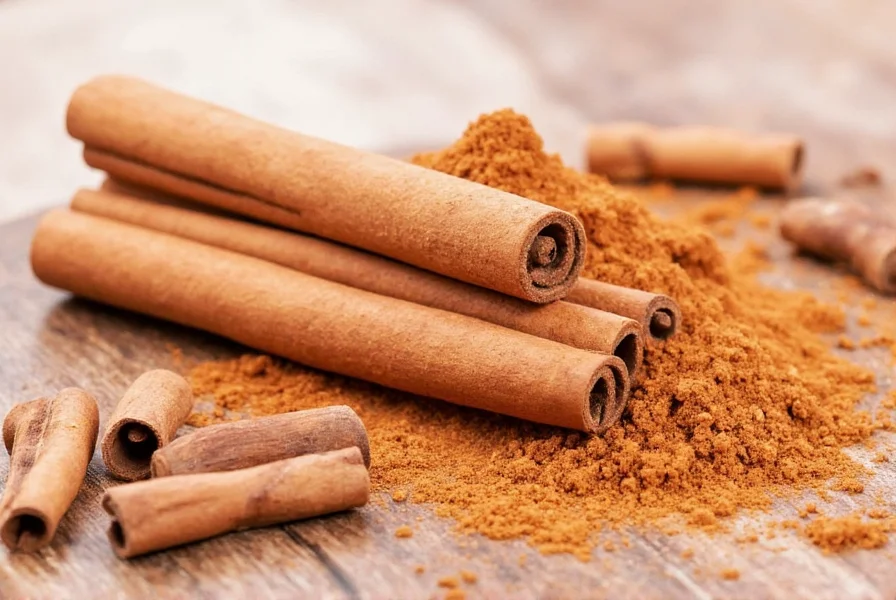Cinnamon isn't just a flavorful spice—it's a powerhouse of bioactive compounds with impressive health potential. With roots tracing back to ancient Egyptian and Chinese medicine, modern science continues validating many traditional uses while uncovering new applications. This comprehensive guide examines 20 evidence-based benefits of cinnamon, distinguishing between well-established effects and promising areas requiring further research.
Understanding Cinnamon Varieties
Before exploring benefits, it's crucial to recognize there are two primary types:
| Type | Scientific Name | Key Characteristics | Coumarin Content |
|---|---|---|---|
| Ceylon Cinnamon | Cinnamomum verum | "True" cinnamon, delicate flavor, multiple thin layers | Low (0.004-0.13%) |
| Cassia Cinnamon | Cinnamomum cassia | Stronger flavor, thicker single-layer bark, most common in US | High (2.15-6.97%) |
For regular consumption, Ceylon is generally preferred due to significantly lower coumarin levels—a compound that may cause liver issues in excessive amounts. Most research doesn't specify which variety was used, creating some interpretation challenges.
Metabolic Health Benefits
1. Blood Sugar Regulation
Multiple studies demonstrate cinnamon's ability to improve insulin sensitivity. A comprehensive review found cinnamon reduced fasting blood glucose by 10.3-29% in people with type 2 diabetes. The spice appears to mimic insulin and enhance glucose uptake by cells.
2. Reduced HbA1c Levels
Long-term blood sugar control marker HbA1c showed significant improvement in clinical trials. Participants consuming 1-6 grams daily for 8-12 weeks experienced average reductions of 0.83%—comparable to some pharmaceutical interventions.
3. Slowed Gastric Emptying
Cinnamon delays stomach emptying, preventing rapid blood sugar spikes after meals. This effect, demonstrated in human studies, contributes to more stable energy levels throughout the day.
4. Improved Lipid Profiles
Research shows cinnamon supplementation significantly reduces triglycerides, LDL cholesterol, and total cholesterol while maintaining or increasing HDL ('good') cholesterol—key factors in metabolic syndrome management.
Anti-Inflammatory and Antioxidant Effects
5. Potent Antioxidant Capacity
Cinnamon ranks #1 among 36 popular spices for antioxidant activity. Its polyphenols combat oxidative stress more effectively than many fruits and vegetables, protecting cells from free radical damage.
6. Reduced Inflammatory Markers
Clinical evidence shows cinnamon lowers C-reactive protein (CRP) and other inflammatory markers. This anti-inflammatory effect may benefit conditions like arthritis and inflammatory bowel disease.
7. Neuroprotective Properties
Cinnamon compounds inhibit tau protein aggregation and oxidative stress in brain cells—key factors in Alzheimer's and Parkinson's disease progression. Animal studies show promising cognitive preservation effects.
8. Antimicrobial Activity
Cinnamaldehyde, cinnamon's primary active component, demonstrates broad-spectrum antimicrobial effects against bacteria (including E. coli), fungi, and viruses—making it valuable for food preservation and potential infection management.
Cardiovascular Benefits
9. Blood Pressure Reduction
Multiple studies report modest but significant reductions in both systolic and diastolic blood pressure among cinnamon consumers, particularly those with prediabetes or metabolic disorders.
10. Improved Endothelial Function
Cinnamon enhances blood vessel flexibility and function, a critical factor in preventing atherosclerosis. This effect appears dose-dependent and more pronounced with consistent, long-term use.
11. Reduced Oxidized LDL
By preventing LDL cholesterol oxidation—a key step in plaque formation—cinnamon helps protect against cardiovascular disease development.
Neurological and Cognitive Benefits
12. Enhanced Brain Function
Human trials show acute cinnamon consumption improves attention, memory, and cognitive processing speed. The mechanism likely involves increased cerebral blood flow and reduced neuroinflammation.
13. Potential Depression Relief
Cinnamon's anti-inflammatory effects may benefit mood disorders. Preliminary research suggests it modulates neurotransmitters like dopamine and serotonin, though human studies remain limited.
14. Multiple Sclerosis Management
Research indicates sodium benzoate (a cinnamon metabolite) may help regulate immune responses in multiple sclerosis by promoting protective T-reg cells while suppressing harmful inflammatory pathways.
Digestive and Metabolic Support
15. Gut Microbiome Enhancement
Cinnamon promotes beneficial gut bacteria while inhibiting pathogens. This prebiotic-like effect supports digestive health and may improve nutrient absorption.
16. Reduced Non-Alcoholic Fatty Liver Disease Markers
Studies show cinnamon supplementation decreases liver enzymes (ALT, AST) and improves insulin resistance in NAFLD patients, suggesting protective effects against fatty liver progression.
17. Menstrual Pain Relief
Women with primary dysmenorrhea experienced significant pain reduction when taking cinnamon capsules compared to placebo, likely due to its anti-inflammatory and muscle-relaxing properties.
Additional Evidence-Based Benefits
18. Allergy Symptom Reduction
Cinnamon extracts demonstrate mast cell stabilization effects, potentially reducing histamine release and associated allergy symptoms like sneezing and itching.
19. Bone Health Support
Animal studies indicate cinnamon may increase bone density by stimulating osteoblast activity and reducing bone resorption—suggesting potential benefits for osteoporosis prevention.
20. Wound Healing Acceleration
Topical cinnamon applications show promise in accelerating wound closure and reducing infection risk due to combined antimicrobial and tissue-regenerative properties.
Practical Usage Guidelines
For maximum benefit with minimal risk:
- Choose Ceylon cinnamon for regular consumption
- Use 1-2 teaspoons (2-4 grams) daily for therapeutic effects
- Combine with black pepper to enhance absorption
- Avoid exceeding 6 grams daily of Cassia cinnamon due to coumarin content
- Consult your physician before using medicinally if taking blood thinners
While these benefits show promise, cinnamon should complement—not replace—medical treatments. Most studies used concentrated extracts rather than culinary amounts, so manage expectations about dietary cinnamon's effects.

Important Considerations
Cinnamon's benefits must be weighed against potential concerns:
- Coumarin content: Cassia contains high levels that may cause liver damage with prolonged high-dose use
- Drug interactions: May enhance blood-thinning medications' effects
- Pregnancy: High doses not recommended during pregnancy
- Allergies: Rare but possible, especially among those sensitive to balsam of Peru
As with any natural remedy, individual responses vary. Start with small amounts to assess tolerance before increasing consumption.

Conclusion
Cinnamon's impressive range of health benefits stems from its complex phytochemistry, particularly cinnamaldehyde, cinnamic acid, and proanthocyanidins. While not a miracle cure, incorporating moderate amounts of quality cinnamon—preferably Ceylon variety—into your diet represents a safe, evidence-supported strategy for enhancing metabolic health, reducing inflammation, and supporting overall wellness. Future research will likely uncover additional applications as scientists continue investigating this ancient spice's modern potential.
Frequently Asked Questions
How much cinnamon should I take daily for health benefits?
For Ceylon cinnamon, 1-2 teaspoons (2-4 grams) daily provides benefits with minimal risk. For Cassia cinnamon, limit to 1 teaspoon (2 grams) daily due to higher coumarin content. Therapeutic studies typically used 1-6 grams daily for 8-12 weeks under medical supervision.
Which is better: Ceylon or Cassia cinnamon for health benefits?
Ceylon cinnamon (Cinnamomum verum) is generally preferred for regular consumption due to its significantly lower coumarin content (0.004-0.13% vs. 2.15-6.97% in Cassia). Both varieties offer similar health benefits, but Ceylon allows for safer long-term use at therapeutic doses.
Can cinnamon lower blood sugar immediately after eating?
Yes, studies show cinnamon can reduce post-meal blood sugar spikes by 18-29% when consumed with carbohydrate-rich meals. This effect comes from slowed gastric emptying and improved insulin sensitivity, with benefits noticeable within 30-60 minutes of consumption.
Are there any medications that shouldn't be taken with cinnamon?
Cinnamon may interact with blood-thinning medications (like warfarin) due to its coumarin content and potential additive effects. It may also enhance diabetes medications' effects, potentially causing hypoglycemia. Always consult your physician before using cinnamon medicinally if taking prescription medications.
How long does it take to see cinnamon's health benefits?
Some effects like reduced post-meal blood sugar spikes occur immediately. For measurable improvements in fasting glucose or HbA1c, studies typically show results after 8-12 weeks of consistent daily use at therapeutic doses (1-6 grams). Individual responses vary based on health status and cinnamon type used.











 浙公网安备
33010002000092号
浙公网安备
33010002000092号 浙B2-20120091-4
浙B2-20120091-4